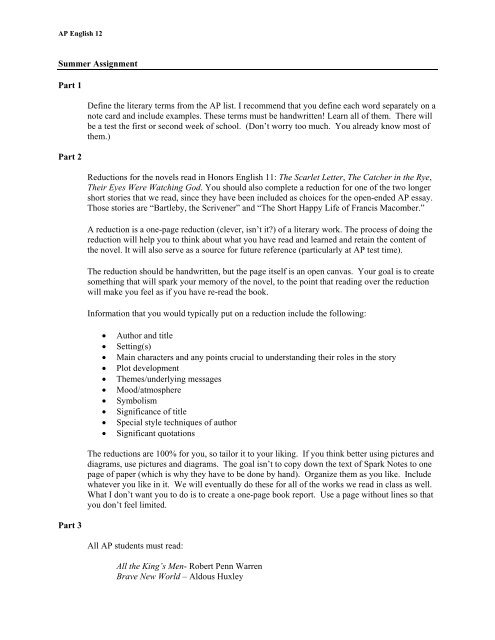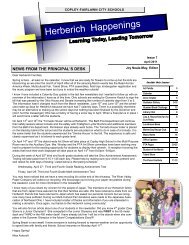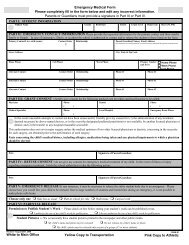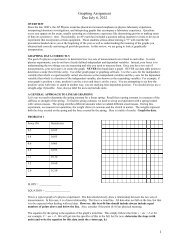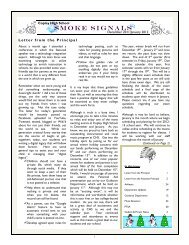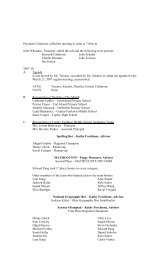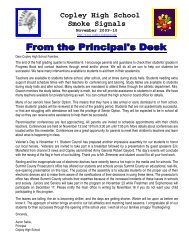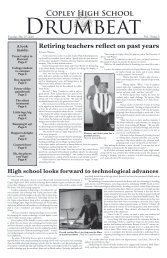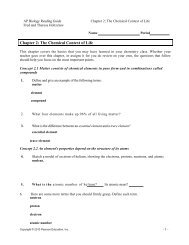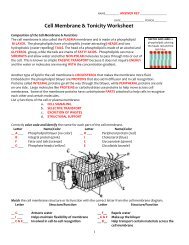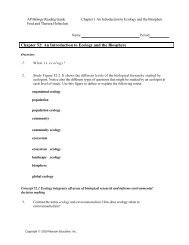Summer Assignment Part 1 Define the literary terms from the AP list ...
Summer Assignment Part 1 Define the literary terms from the AP list ...
Summer Assignment Part 1 Define the literary terms from the AP list ...
- No tags were found...
Create successful ePaper yourself
Turn your PDF publications into a flip-book with our unique Google optimized e-Paper software.
<strong>AP</strong> English 12<strong>Summer</strong> <strong>Assignment</strong><strong>Part</strong> 1<strong>Part</strong> 2<strong>Part</strong> 3<strong>Define</strong> <strong>the</strong> <strong>literary</strong> <strong>terms</strong> <strong>from</strong> <strong>the</strong> <strong>AP</strong> <strong>list</strong>. I recommend that you define each word separately on anote card and include examples. These <strong>terms</strong> must be handwritten! Learn all of <strong>the</strong>m. There willbe a test <strong>the</strong> first or second week of school. (Don’t worry too much. You already know most of<strong>the</strong>m.)Reductions for <strong>the</strong> novels read in Honors English 11: The Scarlet Letter, The Catcher in <strong>the</strong> Rye,Their Eyes Were Watching God. You should also complete a reduction for one of <strong>the</strong> two longershort stories that we read, since <strong>the</strong>y have been included as choices for <strong>the</strong> open-ended <strong>AP</strong> essay.Those stories are “Bartleby, <strong>the</strong> Scrivener” and “The Short Happy Life of Francis Macomber.”A reduction is a one-page reduction (clever, isn’t it?) of a <strong>literary</strong> work. The process of doing <strong>the</strong>reduction will help you to think about what you have read and learned and retain <strong>the</strong> content of<strong>the</strong> novel. It will also serve as a source for future reference (particularly at <strong>AP</strong> test time).The reduction should be handwritten, but <strong>the</strong> page itself is an open canvas. Your goal is to createsomething that will spark your memory of <strong>the</strong> novel, to <strong>the</strong> point that reading over <strong>the</strong> reductionwill make you feel as if you have re-read <strong>the</strong> book.Information that you would typically put on a reduction include <strong>the</strong> following:• Author and title• Setting(s)• Main characters and any points crucial to understanding <strong>the</strong>ir roles in <strong>the</strong> story• Plot development• Themes/underlying messages• Mood/atmosphere• Symbolism• Significance of title• Special style techniques of author• Significant quotationsThe reductions are 100% for you, so tailor it to your liking. If you think better using pictures anddiagrams, use pictures and diagrams. The goal isn’t to copy down <strong>the</strong> text of Spark Notes to onepage of paper (which is why <strong>the</strong>y have to be done by hand). Organize <strong>the</strong>m as you like. Includewhatever you like in it. We will eventually do <strong>the</strong>se for all of <strong>the</strong> works we read in class as well.What I don’t want you to do is to create a one-page book report. Use a page without lines so thatyou don’t feel limited.All <strong>AP</strong> students must read:All <strong>the</strong> King’s Men- Robert Penn WarrenBrave New World – Aldous Huxley
<strong>AP</strong> English 12For each novel, you need to do a double-entry diary (DED). It’s similar to a journal entry, butuses a two-column format and is more specific, efficient, and easier to read. 1Here’s how one teacher describes <strong>the</strong> assignment 2 :Passage <strong>from</strong> novel:As you read, use post-it notes to mark interestingphrases, vivid description, exciting events, or o<strong>the</strong>rparts of <strong>the</strong> story that evoke emotion or response.Select a passage – a few words to a few sentences – thatcaptures you interest for any reason at all.Quote that passage on <strong>the</strong> left side of your journal.Copy <strong>the</strong> passage exactly using quotation marks. Besure to include <strong>the</strong> page number.Response:Write your response in <strong>the</strong> right side of yourpage. Each response should be about 1/3 to1/2 page. Responses shorter than this willnot receive full credit. This is where youshow me what you are thinking as you read.Explain why <strong>the</strong> passage engaged yourinterest. Some ways to respond to showactive reading are:Question: Ask about anything that puzzlesyou. For example: Could this really happen?Are people really this…polite/mean/romantic/religious/violent, etc?What does this word mean <strong>the</strong> way it is usedhere? Why did <strong>the</strong> author choose this way todescribe <strong>the</strong> voice/character/action, etc?Predict: Answer <strong>the</strong>se questions: What willhappen next? Where do you think this isleading? Who is <strong>the</strong> killer? Will <strong>the</strong>secharacters fall in love/end up toge<strong>the</strong>r?Clarify: What do you understand now thatyou did not get previously? Have yourquestions been answered? Were yourpredictions accurate? Do you understandsomething you didn’t before?Connect: Text-to-Text (What o<strong>the</strong>r works orliterature, film, art, etc. does this remind youof? What makes <strong>the</strong> connection for you?),Text-to-Self (Is <strong>the</strong>re some connectionbetween <strong>the</strong> words on <strong>the</strong> page and yourlife?), Text-to-World (Do you see somereflection of <strong>the</strong> world or of society here?).Evaluate: Give your opinion of <strong>the</strong>character/event/word/sentence/message.What makes this passage effective? What doyou like or dislike about it?Analyze: How does <strong>the</strong> author impact <strong>the</strong>1 To set up columns in Microsoft Word, see <strong>the</strong> attached page.2 http://staff.esuhsd.org/~mccreadyl/evlibrary/apeng3.htm
<strong>AP</strong> English 12reader: imagery, dialect, comparisons,etc…How original and vivid is <strong>the</strong> passage?I have included a very short example of a DED, created by Mr. Turakhia, <strong>the</strong> former <strong>AP</strong> teacher.He created this DED for freshmen; so, even though this is an example, I expect your entries to bemore thoughtful and engaging.Some of your comments should focus on <strong>literary</strong> elements of <strong>the</strong> novel that yourecognized as you were reading. This type of comment would be considered acomment of evaluation. For example, if you want to make a comment on <strong>the</strong> syntaxof a particular passage in All <strong>the</strong> Kings Men, you should type <strong>the</strong> passage in <strong>the</strong> leftcolumn and <strong>the</strong>n your ideas as to what is striking/significant about <strong>the</strong> syntax in <strong>the</strong>right column. Or you may comment on characterization, or anti<strong>the</strong>sis or ambiguity.For Brave New World, you may want to comment on genre or foil or tone. If youwant a number, let’s say at least four of your entries for each book MUST address some<strong>literary</strong> figure.Of course, you’re wondering about length, and <strong>the</strong> number of entries required per book.This question makes me a bit queasy. Here’s why: All <strong>the</strong> King’s Men is long…<strong>the</strong>equivalent of 2.5 The Catcher in <strong>the</strong> Ryes or 3 Their Eyes Were Watching Gods. So, let’sgo with an estimate. For All <strong>the</strong> King’s Men, do at least two entries per chapter. For <strong>the</strong>o<strong>the</strong>r novel, I’m expecting twelve entries. The passages you respond to should come<strong>from</strong> all areas of <strong>the</strong> books, <strong>the</strong> beginning, middle, and end. I don’t think that will be toobad—it’s easy, conversational writing.The summer assignments are due ONE WEEK BEFORE SCHOOL STARTS. You are todrop <strong>the</strong>m off in <strong>the</strong> office (I will have a box) and I will pick <strong>the</strong>m up on August 16 byNOON. If your assignments are not in <strong>the</strong> office by noon on that day, you did not do <strong>the</strong>assignment. Do not email me with your sob story.Just as a heads up, when we start school, I will be introducing schools of <strong>literary</strong>criticism; we dabbled in <strong>the</strong>se ideas this year (structuralism, feminism, andpsychoanalytic are a few), but we will expand those ideas during <strong>AP</strong>. Purdue’s OnlineWriting Lab is a terrific source of information. So, you might want to get acquainted.
<strong>AP</strong> English 12Example of a DED (made for freshmen)To Kill a MockingbirdChapter 12p. 115After one altercation when Jemhollered, "It's time you startedbein' a girl and acting right!" Iburst into tears and fled toCalpurnia.p. 115"Don't you fret too much overMister Jem-" she began.I wonder if this idea is still true today. During <strong>the</strong> 1930s, it seems thatgirls played with dolls and played house, while boys played sports. Idon’t think that we separate boys and girls like that. Girls play allkinds of sports now. Do people still say things like “Act like a boy,”or “Act like a girl”? If <strong>the</strong>y do, what do <strong>the</strong>y mean?I still remember <strong>the</strong> first time a worker in a store called me sir. It wasone of <strong>the</strong> first times I felt like an adult."Mister Jem?""Yeah, he's just about MisterJem now."p. 116But summer came and Dill wasnot <strong>the</strong>re. I received a letter anda snapshot <strong>from</strong> him. The lettersaid he had a new fa<strong>the</strong>r whosepicture was enclosed, and hewould have to stay in Meridianbecause <strong>the</strong>y planned to build afishing boat.p. 116I had never thought about it, butsummer was Dill by <strong>the</strong> fishpoolsmoking string, Dill's eyes alivewith complicated plans to makeBoo Radley emerge;p. 117Calpurnia evidentlyremembered a rainy Sundaywhen we were both fa<strong>the</strong>rlessand teacherless. Left to its owndevices, <strong>the</strong> class tied EuniceAnn Simpson to a chair andplaced her in <strong>the</strong> furnace room.The experience of getting a new parent or step-parent must be reallyodd. I’ve never had to go through that so I’m not really sure what it’slike, but I imagine that it must be difficult to get a step-parent and allof a sudden have to accept <strong>the</strong>m as a rule-maker in <strong>the</strong> house. Plus, Ithink I would be confused with all of <strong>the</strong> names—some people change<strong>the</strong>m, some hyphenate, some leave <strong>the</strong> names alone, but even figuringout what to call <strong>the</strong> new person would be an awkward experience(Dad? Bob? Hey…).This really reminds me of my childhood and <strong>the</strong> way we used to playoutside, hike trails through <strong>the</strong> woods, and play by creeks. Somehow,we were able to keep ourselves completely entertained all day long. Ijust don’t see kids playing outside anymore <strong>the</strong> way we used to.Maybe <strong>the</strong>y have more stuff to do with computer games, PS2s andXboxes, but it seems like <strong>the</strong>y’re missing out on something cool.I remember an incident <strong>from</strong> seventh grade, when my Spanish classhad a substitute teacher. One of <strong>the</strong> boys in <strong>the</strong> class sat behind a girlwith really long hair, and somehow, he tied her hair in a knot around<strong>the</strong> back of her chair. When she tried to get up, her head jerked backso hard that she screamed really loud. With all of her crying andpanicking, it seemed like it took <strong>the</strong> substitute over ten minutes tountie her <strong>from</strong> <strong>the</strong> chair.


